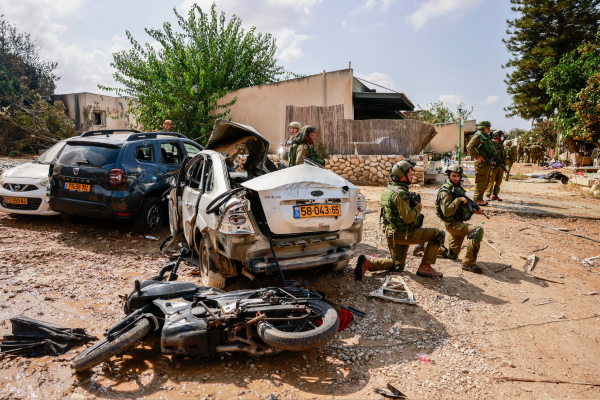South African Jews feel increasingly vulnerable but are determined to continue to show solidarity with Israel.
By Rolene Marks, JNS
A delegation of senior South African Jewish leaders visited Israel last week to express solidarity with the Jewish state and bear witness to the atrocities Hamas committed on Oct. 7.
The visit comes at a time when relations between the two countries’s governments are at an all-time low following South Africa’s expressions of solidarity with Hamas and changes of genocide Pretoria filed at the International Court of Justice. The trip was organized and sponsored by the Jewish National Fund South Africa in conjunction with the South African Zionist Federation.
“We came on this South African solidarity mission at this crucial time to make clear the South African Jewish community’s unwavering support for Israel, despite the pressure from the South African government, Michael Kransdorff, chairman of JNF South Africa, told JNS at a Shabbat lunch in Jerusalem.
We ended our visit at the site of the Nova Dance Festival, where we paid tribute to the young souls whose futures were tragically cut short by the senseless violence of Hamas terrorists. 🕯 pic.twitter.com/ylkHNjWoAq
— South African Zionist Federation (@SAzionfed) February 19, 2024
“We have come to bear witness to the atrocities committed by Hamas on October 7. We have come to commemorate the South Africans who have fallen in this war. We have come to tell the families of the 134 hostages still in Gaza that we are doing everything we can to demand their immediate release,” Kransdorff said.
In recent weeks, South Africa’s ruling African National Congress has ramped up its condemnation of Israel’s war with Hamas. Pretoria filed a further request for “urgent measures” against impending Israeli incursions into the Gaza city of Rafah, a request that the International Court of Justice rejected.
On Feb. 18, in a show of solidarity with “Palestine” and to “demonstrate the power of sports in bridging divides,” a charity match titled “Football for Humanity” was held between Palestinian and S.A. invitational men’s soccer teams in Cape Town. Prominently displayed were signs in support of Hamas. The Palestinian team won 1-0.
A bill has been submitted to the U.S. Congress calling for a full review of the country’s bilateral relationship with S.A. following the ICJ ruling that found it plausible that Israel may have committed acts of genocide against Gaza.
The bipartisan bill, which was introduced by Reps. John James (R-Mich.) and Jared Moskowitz (D-Fla.), could threaten South Africa’s prospects to benefit from the African Growth and Opportunity Act (AGOA).
The bill accuses the ANC of acting inconsistently with its publicly stated policy of nonalignment in international affairs. It further states that the South African government has a history of siding with malign actors, including Hamas and the Russian Federation. The bill notes that the South African government’s support of the Hamas terror group dates back to 1994, when the ANC first came into power, taking a hardline stance of consistently accusing Israel of the practice of apartheid.
The South African Foreign Ministry also said that any of the country’s citizens fighting in the IDF could face prosecution at home.
The ministry said it was “gravely concerned” by reports that some Israeli soldiers, who are also South African nationals, have joined the IDF to fight in Gaza, or are considering doing so. “Such action can potentially contribute to the violation of international law and the commission of further international crimes, thus making them liable for prosecution in South Africa,” the ministry said.
South African Jews feel increasingly vulnerable but are determined to continue to show solidarity with Israel.
Howard Feldman, a popular broadcaster and media personality who was part of the solidarity delegation, said: “We have an enormously sophisticated and impressive constitution. And for that reason, I believe that we don’t need to cower. We have every right to be just as vocal as South Africa’s president. I have a voice. We have freedom of expression, and I’m going to represent the community as well as I can and whenever I can.”
South Africans will head to the polls on May 29, in a critical national election that many hope will result in a shift away from the current foreign policy.
During our visit we witnessed the heartbreaking aftermath of the October 7th tragedy in the small community of Kfar Aza. The devastation was profound, with homes destroyed and lives lost. 💔 pic.twitter.com/6xsKrdH3WN
— South African Zionist Federation (@SAzionfed) February 19, 2024
